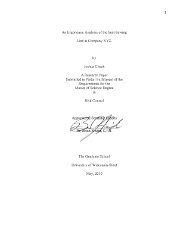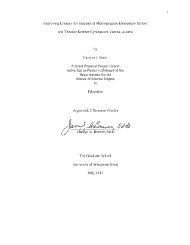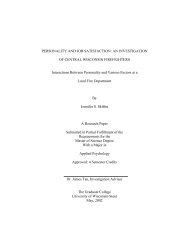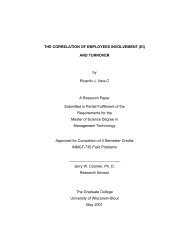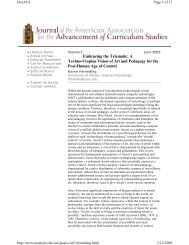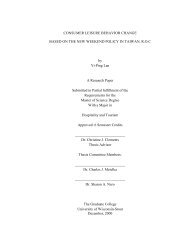A Review of the Literature on Three Types of Disenfranchised Grief ...
A Review of the Literature on Three Types of Disenfranchised Grief ...
A Review of the Literature on Three Types of Disenfranchised Grief ...
You also want an ePaper? Increase the reach of your titles
YUMPU automatically turns print PDFs into web optimized ePapers that Google loves.
were generally willing to set aside <str<strong>on</strong>g>the</str<strong>on</strong>g>ir own grief in order to support <str<strong>on</strong>g>the</str<strong>on</strong>g>ir adult child. In<br />
exploring <str<strong>on</strong>g>the</str<strong>on</strong>g> exchange <str<strong>on</strong>g>of</str<strong>on</strong>g> intergenerati<strong>on</strong>al support, White et al. (2008) found that following a<br />
child's death, much more support was provided to <str<strong>on</strong>g>the</str<strong>on</strong>g> adult child by <str<strong>on</strong>g>the</str<strong>on</strong>g> grandparent than vice<br />
versa. However, intergenerati<strong>on</strong>al relati<strong>on</strong>ships were described by both parents and grandparents<br />
as being extremely important in helping to cope with <str<strong>on</strong>g>the</str<strong>on</strong>g> loss. Galinsky (2001) found that<br />
following <str<strong>on</strong>g>the</str<strong>on</strong>g> child's death, grandparents <str<strong>on</strong>g>of</str<strong>on</strong>g>ten took <strong>on</strong> many <str<strong>on</strong>g>of</str<strong>on</strong>g> <str<strong>on</strong>g>the</str<strong>on</strong>g> daily household and<br />
parenting resp<strong>on</strong>sibilities which meant extra challenges and demands at a time when <str<strong>on</strong>g>the</str<strong>on</strong>g>y were<br />
already struggling with <str<strong>on</strong>g>the</str<strong>on</strong>g>ir own intense grief. That grandparents are expected to keep <str<strong>on</strong>g>the</str<strong>on</strong>g>ir<br />
own emoti<strong>on</strong>s in check so that <str<strong>on</strong>g>the</str<strong>on</strong>g>y can focus <strong>on</strong> <str<strong>on</strong>g>the</str<strong>on</strong>g> needs <str<strong>on</strong>g>of</str<strong>on</strong>g> <str<strong>on</strong>g>the</str<strong>on</strong>g>ir bereaved family members<br />
suggests that grandparents are not defined or recognized as being legitimate grievers. This social<br />
definiti<strong>on</strong> is so deeply engrained that it seems to have been internalized by bereaved<br />
grandparents <str<strong>on</strong>g>the</str<strong>on</strong>g>mselves; <str<strong>on</strong>g>the</str<strong>on</strong>g>y are <str<strong>on</strong>g>of</str<strong>on</strong>g>ten determined to ignore or minimize <str<strong>on</strong>g>the</str<strong>on</strong>g>ir own grief in<br />
order to focus solely <strong>on</strong> <str<strong>on</strong>g>the</str<strong>on</strong>g> grief <str<strong>on</strong>g>of</str<strong>on</strong>g> <str<strong>on</strong>g>the</str<strong>on</strong>g>ir bereaved family members. Galinsky (2001) wrote<br />
about a bereaved grandmo<str<strong>on</strong>g>the</str<strong>on</strong>g>r who, <strong>on</strong> <str<strong>on</strong>g>the</str<strong>on</strong>g> day <str<strong>on</strong>g>of</str<strong>on</strong>g> her grandchild's funeral, said that she "wanted<br />
to be so str<strong>on</strong>g for [her] daughter <strong>on</strong> this day" and was ashamed <str<strong>on</strong>g>of</str<strong>on</strong>g> herself for being unable to<br />
c<strong>on</strong>trol her emoti<strong>on</strong>s (p. 4). Fur<str<strong>on</strong>g>the</str<strong>on</strong>g>rmore, grandparents <str<strong>on</strong>g>of</str<strong>on</strong>g>ten feel uncomfortable sharing <str<strong>on</strong>g>the</str<strong>on</strong>g>ir<br />
grief with o<str<strong>on</strong>g>the</str<strong>on</strong>g>rs, and when <str<strong>on</strong>g>the</str<strong>on</strong>g>ir pain does not pass quickly, experience shame and guilt over<br />
<str<strong>on</strong>g>the</str<strong>on</strong>g>ir c<strong>on</strong>tinued grief.<br />
Lack <str<strong>on</strong>g>of</str<strong>on</strong>g> Recogniti<strong>on</strong> and Acknowledgment. The bereavement experience <str<strong>on</strong>g>of</str<strong>on</strong>g><br />
grandparents who have lost a grandchild is an area that has received limited attenti<strong>on</strong> in <str<strong>on</strong>g>the</str<strong>on</strong>g><br />
scholarly literature. Inquiries <str<strong>on</strong>g>of</str<strong>on</strong>g> bereavement, mourning, and grief tend to focus more <strong>on</strong> parents<br />
and siblings than intergenerati<strong>on</strong>al relatives (Galinsky, 2001). This lack <str<strong>on</strong>g>of</str<strong>on</strong>g> scholarly attenti<strong>on</strong> is<br />
indicative <str<strong>on</strong>g>of</str<strong>on</strong>g> <str<strong>on</strong>g>the</str<strong>on</strong>g> general lack <str<strong>on</strong>g>of</str<strong>on</strong>g> acknowledgment <str<strong>on</strong>g>of</str<strong>on</strong>g> grandparent grief and <str<strong>on</strong>g>the</str<strong>on</strong>g> absence <str<strong>on</strong>g>of</str<strong>on</strong>g><br />
17





